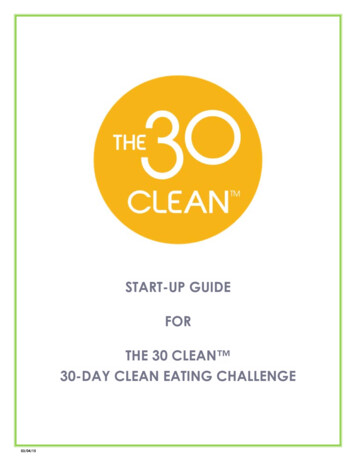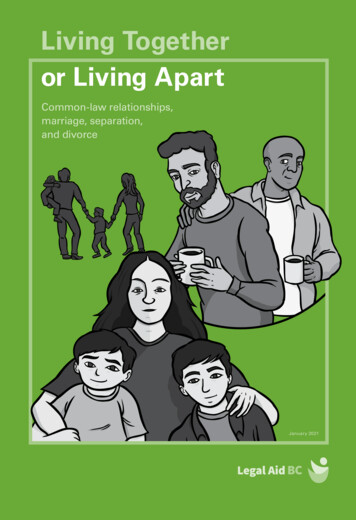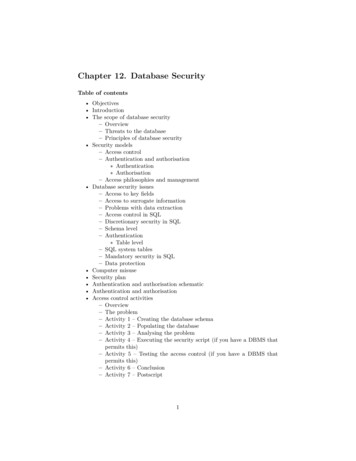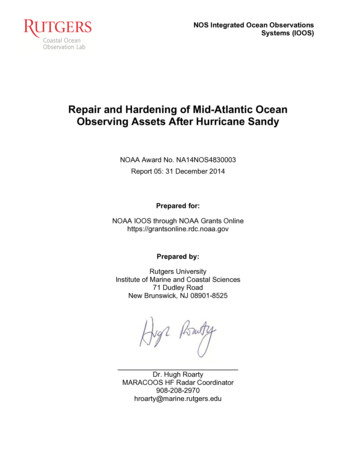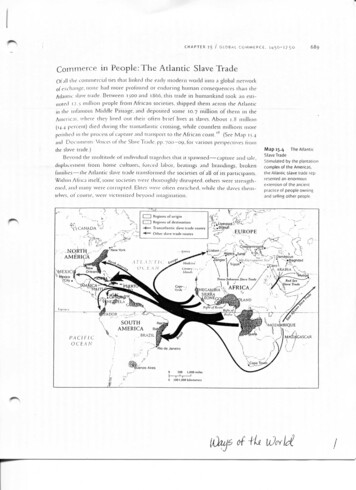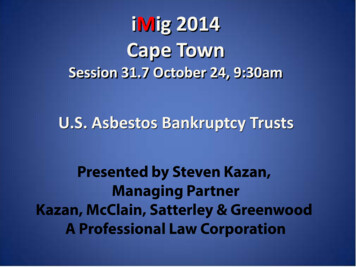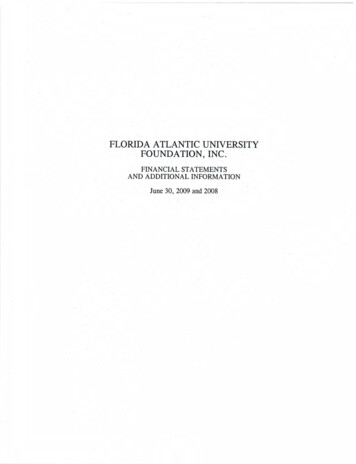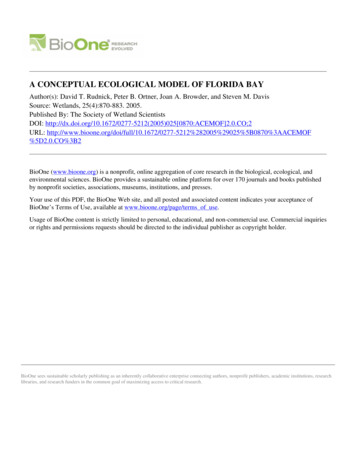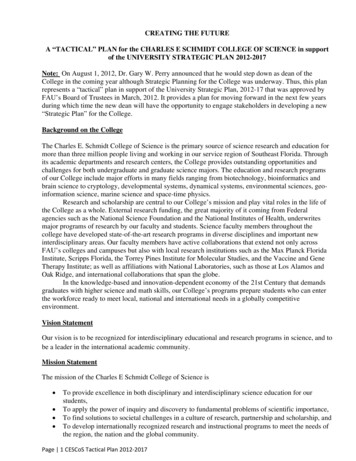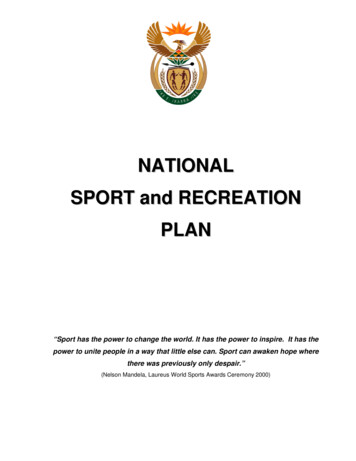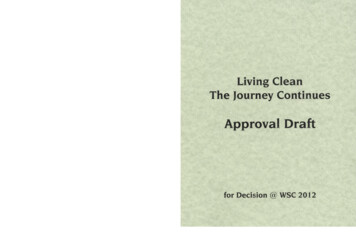
Transcription
Living CleanThe Journey ContinuesApproval Draftfor Decision @ WSC 2012
Living Clean Approval DraftCopyright 2011 byNarcotics Anonymous World Services, Inc.All rights reservedWorld Service OfficePO Box 9999Van Nuys, CA 91409T 1/818.773.9999F 1/818.700.0700www.na.orgWSO Catalog Item No. 9146Living Clean Approval Draft for Decision @ WSC 2012
Table of ContentsPreface .7Chapter OneLiving Clean.9NA offers us a path, a process, and a way of life. The work and rewards of recovery are never-ending. Wecontinue to grow and learn no matter where we are on the journey, and more is revealed to us as we goforward. Finding the spark that makes our recovery an ongoing, rewarding, and exciting journey requiresactive change in our ideas and attitudes. For many of us, this is a shift from desperation to passion.Keys to Freedom . 10Growing Pains.12A Vision of Hope . 15Desperation to Passion . 16Why We Stay . 17Chapter TwoThe Ties That Bind .19In recovery, we are free to explore and to consider who we are and who we want to become. The changes weexperience in the process can feel pretty disruptive to our identity and our relationships, but through thatstruggle we find that our acceptance, love, and faith continue to grow. Though our goals and our methodsmay vary, what we have in common are the tools and principles that allow us to be who we are. Together werise to a point of freedom.Connection to Ourselves . 19Connection to a Higher Power . 21Connection to the World Around Us . 24Connection to Others . 25Chapter ThreeA Spiritual Path .29The spirituality we experience in NA is simple and practical: It allows us to live in harmony with our worldand to experience empathy and compassion for others. The steps are a path to spiritual growth; we awaken toour own spirituality. As we develop a relationship with a Higher Power in whatever way we understand that,we come to understand that our spirituality is not a part of our lives; it is a way of life that brings us to anunderstanding of our purpose and the freedom we had been seeking all along.Awakening to Our Spirituality . 29A Spiritual, Not Religious Program . 31A Spiritual Journey. 33Spirituality Is Practical . 35Walking the Walk . 37Spirituality in Action. 39Conscious Contact . 42Creative Action of the Spirit . 443
4Chapter FourOur Physical Selves . 47Learning to live in our bodies isn’t easy. We haven’t been kind to them, and often they bear the painful scarsof our addiction. Making peace with our physical selves is necessary for our physical survival—but it is also apart of our amends process, an act of self-acceptance, and a way we experience freedom, healing, and joy. Thischapter addresses the way we treat ourselves in recovery, learning to find pleasure in being physically aliveand aware—and facing our aging, our vulnerability, and our mortality.It’s a Relationship . 47Letting Ourselves Go . 48Sex . 51Thrill-Seeking and Adventure . 52Wellness and Health . 53Illness. 55Disability . 58Emotional and Spiritual Crisis . 60Aging . 61Death, Dying, and Living with Grief . 62Courage . 65Chapter FiveRelationships . 66Our recovery is based in relationships, and most of us struggle with them in one way or another. Ourrelationships with one another in the rooms, with the families we come from and the families we create, are allplaces where we learn to practice principles, including honesty, empathy, and intimacy. Love is a healingpresence in our lives, and we experience its power when we allow ourselves to reach out.Fellowship. 67Friendship . 70Bridging Two Worlds: Relationships Outside NA . 73Family . 74Being a Parent . 76Amends and Reconciliation . 80Romantic Relationships . 81What We Want . 82What We Ask For . 84The Courage to Trust . 86Conscious Contact . 89Chapter SixA New Way of Life . 91As we get some time in recovery, we get some time in the world as well. Social acceptability does not equalrecovery, to be sure, but that doesn’t mean they’re mutually exclusive, either: For many of us it is somethingwe must learn along the way. Our work habits and our beliefs about work, education, money, and stabilitychange and grow as we stick around—sometimes in surprising ways. Learning to deal with success andLiving Clean Approval Draft for Decision @ WSC 2012
Table of Contents5failure, with risk and responsibility, with stability and change are all part of the process some of us call“growing up in recovery.”Moving Beyond “Social Acceptability” . 91Finding Our Place in the World . 93Stability . 96Getting Out of Our Own Way . 97A Leap of Faith . 100Commitment . 101Education . 102Money . 103Work . 106Anonymity . 108The Gift of Hope . 110Chapter SevenThe Journey Continues .112From the first time we find hope, we are in an ongoing process of spiritual awakening that can last our wholelives, if we are willing. Continuing to feel that our recovery is alive requires us to keep growing. Isolation andcomplacency hold us back from freedom in ways we may not even feel until we are stuck. Generosity of spiritis the antidote for loneliness and alienation. Being of service frees us into our own lives and opens us to thespirit of love that surrounds us. We experience unconditional hope and understand that there is no limit tohow much better we can get. No matter how far we have come, the journey continues.Awakenings . 112Living Our Principles . 113The Lifelong Practice of Surrender. 115Complacency. 116Setting Ourselves Apart . 118Keeping It Real . 120Being of Service. 123Principles, Practice, and Perspective . 126Love . 128Living Clean Approval Draft for Decision @ WSC 2012
6Living Clean Approval Draft for Decision @ WSC 2012
Prefaceur Basic Text assures us that more will be revealed, and our experience bears that out.More has been revealed in the years since those words were written, and morecontinues to be revealed every day that we live clean and practice the principles of recovery.We grow as individuals, and we also grow and mature as a fellowship. As we learn from ourexperience, we pass on that knowledge. This means that each generation of newcomers hasmore resources available in NA than the one before. Whether this strengthens or weakens usdepends entirely on how well we understand our primary purpose and practice the principlesof sharing, caring, and service.OOur greatest treasure and resource is the depth of our personal knowledge of the recoveryprocess. We share that treasure at meetings, at our celebrations, over coffee, and in ourliterature. Once again, we offer in written form as much as we can of our collectiveexperience, strength, and hope. This book, written by addicts for addicts, is a snapshot of ourfellowship: addicts in recovery who have helped each other face life on its own terms, withoutthe use of drugs, for consecutive days, months, years, and decades. It is intended both as anoffering to new members and to rekindle the passion of our oldtimers. It could not possiblycontain all that our members know or believe, but it does reflect what we have beendiscovering and sharing since 1982, when our Basic Text was approved.The first draft of a book titled “Living Clean” was created in 1983, but the history of thisproject goes back even further. As our Basic Text, Narcotics Anonymous, was being written,some of our members knew that it would not be our last word on the subject of living the NAway. The versions that were created in 1983 and 1990 contained a lot of concrete advice,suggestions, and rules for how to get clean and stay clean. But most of us don’t follow rulesvery well. Our experience is sometimes very different from what we wish were true about theprocess. We found that what we share in common are not the particular actions we take, butthe principles we try to practice as we live. In the years that have followed, generations ofaddicts have gotten clean and stayed clean using the Basic Text as our guide, and thatexperience has given us a perspective on the principles of recovery unlike any other.We knew from the beginning that we were describing a problem not related to any singlesubstance, but a disease that, left untreated, would manifest in one symptom or another untilit killed us. A focus on one symptom or substance is too narrow for us. Just as we understandthat addiction affects all aspects of our lives, we can see that recovery affects everything wedo. Our relationships with our families, our work, our spirituality—even our own bodies—areprofoundly shaped by where we come from and the ways in which we address our disease.Just as the rewards of our recovery are often beyond our wildest dreams, we know that theimpact of our recovery on our own lives and on those around us is beyond measure. We maynever know the good we do just by staying clean and living a principled life to the best of ourability. Our gratitude for our new way of life motivates us to keep giving more, living more,and loving more.We are called to tell our story in NA not just once, but over and over. We cannot see theentirety of ourselves in one Fifth Step or one share, and we can’t see the entirety of ourrecovery all at once, either. We see it in layers, and our vision of ourselves changes each time7
8we have a shift in perspective or a change in perception. Telling the truth about our lives isone of the most powerful things we can ever do. We start to see the threads that run throughour experience, even though we may feel like we have been many different people over thecourse of our lives. We can see the patterns that help us or hold us back, and we can findhope even at times when our lives are very difficult.Recovery is a full-contact, lifelong process. The more serious we are about it, the more clearlywe can see how much growth is still available to us, no matter where we are on the journey.We are never done learning. Continued practice of the program of Narcotics Anonymousdoesn’t just make our lives easier. It makes them richer, better, and more interesting. Webegin by staying clean, and from there the program gives us the tools we need to find theanswers that are right for us. Different moments teach us, reach us, or help us break through.We hope that the experience we share here will serve to propel our members forward, beyondwhat we know now.This book is not a catalog of advice, but rather a collection of experience, strength, and hopeabout living clean as we experience it in our daily lives, in our relationships, and in our serviceto others. Not everything in the pages that follow will be equally important to everyone. Eachof us has different challenges on our journey. However, we hope that there is something herefor every member.What follows is the experience of many addicts from all over the world. Hundreds of membersshared their insight on living clean in workshops, letters, conversations, electronic bulletinboards, and audio recordings. The book took shape as it developed. As our journeycontinued, the focus of Living Clean shifted as well. The content and structure changedaccording to the input. The process swung the doors open, and we were amazed at whatdeveloped. We learned from one another, and the sum was greater than its parts. Thecommon thread through our varied experience is that we continue to draw strength from NAno matter how much cleantime we have, no matter how many steps we have worked, and nomatter where life takes us. Sharing our experience gives it meaning and value. And the deeprelationships we form in NA—with one another, with ourselves, and with our Higher Power—become more valuable than we can imagine. We stay connected with the program and thefellowship over many years because we find what we need here. Where once we may havewondered how we could ever make NA a part of our lives, now many of us cannot imagine ourlives without it. When we use the tools available to us, our recovery continues to thrive nomatter what we face or how long we stay clean.The most important thing about living clean is that we are alive to do it, and for people withthe disease of addiction this is nothing less than a miracle. We do recover to live full andrewarding lives. Those lives present us with challenges, some of which we never expected.Living beyond our wildest dreams often means that we are in uncharted territory. Thecountless addicts who have contributed to this book have made clear that the miracle ofgetting clean is not the last one we experience, or the last one we need. We have learned thatwe really can survive anything and stay clean. It’s never too late to start over, reconnect withthe fellowship, work steps, have a spiritual awakening, and find a new way to live. As long aswe are willing to stay clean and keep coming back, our recovery continues to unfold in wayswe couldn’t imagine. We are living clean, and every day the journey continues.Living Clean Approval Draft for Decision @ WSC 2012
Living CleanLiving clean is a lifelong journey, and the NA program gives us tools to build a life infusedwith hope. No matter where we are on our journey, we believe that it can get better,and that we can get better. We practice living a principled life and find a new way to live. Wetry new things, and some of them suit us better than others. As we experience living cleanwith its ups and downs, miracles and struggles, dead ends and open doors, we see the worldmore clearly and better understand our place in it.The program of Narcotics Anonymous is the way we have found to escape lives ofdesperation and pain. But that’s not all NA is: It’s a path, a process, and a way of life. Manyof us come in with just the barest hope that we can get the pain to stop. In the beginning,our willingness is born of our suffering and fear. Living the program changes us in ways wemight expect, and in ways we never imagined. NA gives us the ability to turn our desperationinto a passion to live fully and grow spiritually. We experience relief almost from thebeginning of our recovery, and our first experiences of joy are like seeing color for the firsttime. Our minds are open and our spirits are free. Even if we experience it only for fleetingmoments, that joy carries us through our hardest days and nights.It’s not what we think about our recovery that matters; it’s what we do. Living clean is aspiritual process, and it teaches us that the world is bigger than we imagined and not as farout of reach as we had feared. Our flawed beliefs about people who didn’t use drugs shapedour opinions about what we might be like when we stopped. When we first got clean, many ofus worried that our lives were about to become small and boring. What we find really isbeyond our wildest dreams. We have opportunities and the ability to follow through on them.Perhaps more importantly, our connections with people become intensely important andsatisfying to us. The close friendships we have with members who share our recovery can bea deeper connection than family. We share an intimacy that is really special, and when wecarry that over the course of many years, it grows into an abiding affection and understandingof one another.Commitment to recovery is essential for us. Maintaining recovery as a priority may come tomean different things for us over time. We need to maintain our connection to NA, but takingresponsibility for our lives also matters. So many things compete for our attention, and asaddicts we have a tendency to think in extremes: all or nothing, right or wrong. Finding thebalance is an ongoing negotiation. Attending meetings regularly doesn’t have to mean everynight of the week, but meetings continue to matter for our own well-being and for our abilityto carry the message. Keeping that lifeline strong and ready is a matter of continuingmaintenance. It gets easier when we let go of the idea that it ought to be hard. After manyyears of recovery, a member shared that he was finally able to answer the question “Is itpossible that life is really this simple?” with a simple “Yes.”The principles we practice in NA have meaning throughout our lives. They offer us a way tostop using and to free ourselves to be ourselves. Working the steps, studying the traditions,and applying ourselves to service in and out of NA helps us to discover who we are and what9
10we believe. Carrying the message brings us awareness of our gifts and limitations, and guidesus to change.We can measure our lives not in years or by the things we gain or lose, but by the degree towhich we make peace with our own lives and the world around us. Spiritual growth is the realsuccess. As our recovery unfolds, we find ourselves resolving feelings we never admitted wehad. Open-mindedness gives us the ability to see more and more clearly within ourselves aswe go through the never-ending process of surrendering, taking inventory, and invitingchange.The message we carry has three parts: Any addict can stop using, lose the desire to use, andfind a new way to live. We talk a lot about the first two, because stopping is an emergencywhen we get here, and losing the obsession is necessary for us to enjoy our lives. But thehard work does not end there. Finding a new way to live is not something we do just once.Some of us experience great upheaval as we try again and again to find a life that makessense for us. But we continue to carry the message, using our experience to help others. Themore experience we have to share, the richer our message can become.Keys to FreedomAs we practice these principles in all our affairs, they gain traction in our lives, and theystart feeling more natural. For example, in the beginning we may have to consciouslypractice being honest. As we continue this practice, we find dishonesty progressively moreuncomfortable, perhaps even agonizing; and gradually we notice that honesty has becomemore normal for us. We are basically honest people, and we even like it. Some say this ishow we know a Higher Power is involved. When our defects are removed, we may not feelthem go. We may not even notice the change unless we fall back into old behavior and findthat it is no longer comfortable or workable for us. We call our sponsor in distress overhaving “done it again,” or even because we are thinking about acting on that old defect,and realize how long it has been since that behavior had crossed our minds. Learning tosurvive our impulses without acting out is a new freedom. Over time, the desire to actagainst our values begins to fade.Our self-made prisons no longer serve us. We are free to explore and discover what we aregood at. We are free to participate, create, care and share, surprise ourselves, take risks, bevulnerable, and stand on our own two feet. We find our beliefs and begin to act on them. Wemake decisions based on our values. We walk through fear and wake up to the miracles thatsurround us. We are free to be who we are and live as we choose.When we feel the deepest gratitude, we can look back and see that our path to that momentwas neither short nor straight. What seemed like the worst decisions at one time in ourrecovery opened the door for some of our greatest opportunities later on. We may simplyoutgrow some of our decisions. What was right for us at one point in our recovery may not beright for the rest of our lives, but it can be difficult for us to move on. Gifts can comewrapped in such strange packages that we don’t always recognize them when they arrive.Nothing that happens is entirely good or entirely bad. We do not pretend that there are noLiving Clean Approval Draft for Decision @ WSC 2012
Chapter One – Living Clean11mistakes in recovery, but sometimes those mistakes can take us in a direction we hadn’tthought of before.Recovery is not a standardizing, “cookie-cutter” process. We don’t all go through the processin the same way, and we don’t all come out of it the same. But there are some familiarlandmarks we pass. We have phases and stages, corners we turn, staircases we climb. Each ofus has periods of intense growth and times when change is more subtle. Having a new way tolive means that we have to live in new ways, and we can get confused or lost even when wehave many years clean. Allowing each other room to grow at our own pace is difficult,especially when we care for each other, but self-acceptance and self-respect are the result ofgoing through the process in our own way.Time is not the same as experience. Just because we have been here for a long time doesn’tmean that we know everything we need to know. We don’t graduate from the simple stepsthat keep us clean and free. Our lives continue to unfold. We start at different places and wegrow at different paces. Time represents the opportunity for growth, but we still have to stepup to the challenge and be open to the lessons. Practicing honesty, open-mindedness, andwillingness keeps us teachable, grateful, and humble. The difference between humility andhumiliation can be the level of acceptance we have about the information we get. When welisten with an open mind, anyone can carry a message to us.There are no unnecessary principles in NA, though we may learn them in our own time and inour own order. We can’t expect to find what we are looking for if we work some of the stepsand not others—or if we are ignoring the traditions, or living in conflict with our own values.Spiritual principles are not dependent on time or circumstance. We learn by observation andexperience. There is a difference between feeling like we are so sick that we will never getbetter and knowing that we are never done growing or recovering. Exploration lasts a lifetime.We begin over and over. It gets easier to act in our own best interest, even when we arefeeling resistant. A member shared, “I often hear newcomers say that they can’t imaginegoing to NA meetings for the rest of their lives. I had the same reservation, but today I can’timagine my life without NA.” We learn to do what we have to do, as well as what we want todo. We don’t always want to work our program, but we know the rewards we get when wetake responsibility for our recovery—and the consequences when we do not.New information can be hard for us to accept when it doesn’t come to us in the way we thinkit should. Whether the information itself is surprising or the messenger is not someone weusually look to for guidance, we may dismiss new idea
The Gift of Hope . 110 Chapter Seven The Journey Continues .112 From the first time we find hope, we are in an ongoing process of spiritual awakening that can last our whole lives, if we are willing. Continuing to feel th
